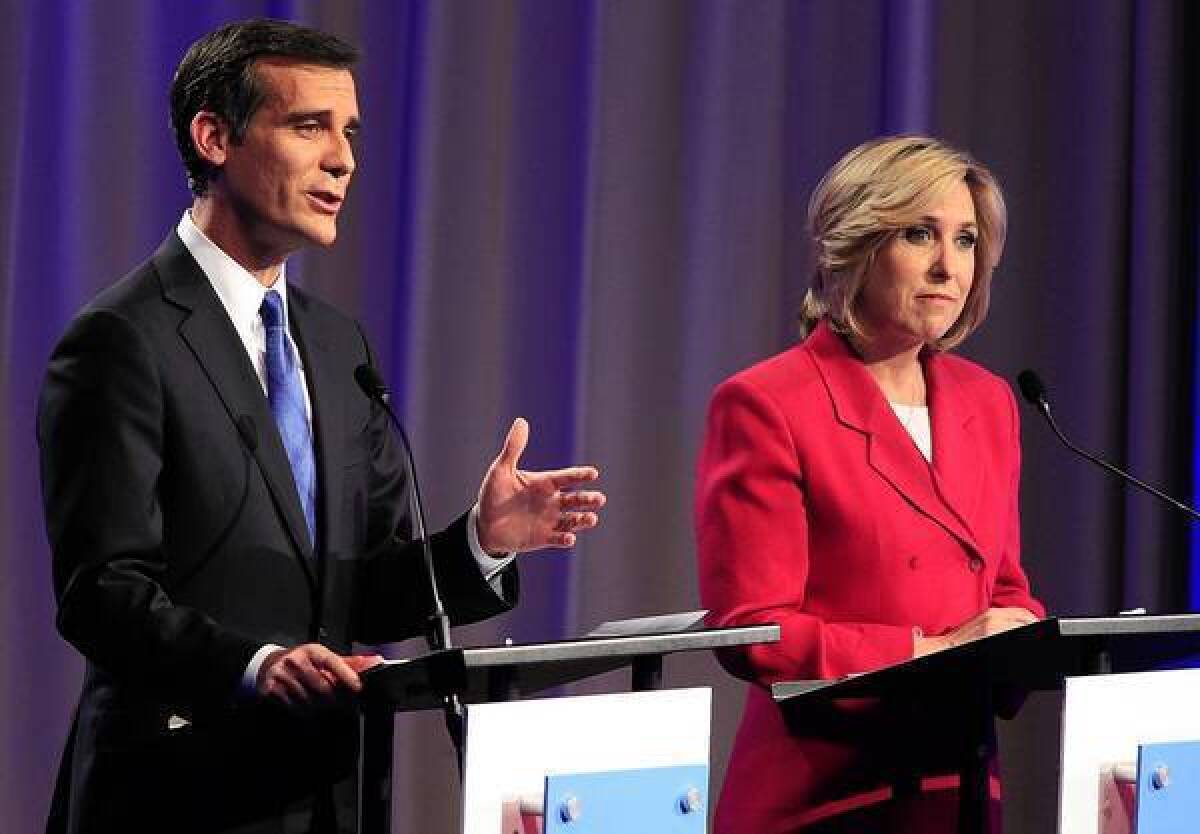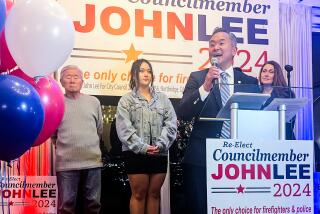Garcetti’s lead over Greuel at 7 percentage points in mayoral race

Eric Garcetti’s lead in the Los Angeles mayor’s race has narrowed to seven percentage points, but his strength among conservatives has blocked rival Wendy Greuel from securing a San Fernando Valley base that is vital to her chances, according to a new USC Price/Los Angeles Times poll.
As the candidates and their partisans swarmed across the city in advance of Tuesday’s runoff election, Garcetti, a city councilman from Silver Lake, held a 48% to 41% lead, the survey found. Voters in the Valley and every other key region of Los Angeles favored him over Greuel, the city controller.
With the campaign’s TV advertising hitting its peak over the weekend, the dynamics of the race could still shift. The poll found 11% of likely voters undecided. And more than 20% of those who were siding with a candidate said they might still change their minds.
Over the last month, the poll found, Greuel has made small gains among women, Latinos, Democrats and Westside voters, offering opportunities for her to build momentum by election day. But all of those groups still preferred Garcetti.
Although the results were tighter than last month, when another poll by the USC Sol Price School of Public Policy and The Times showed Garcetti 10 percentage points ahead, the structure of the race has remained largely stable.
Garcetti holds a central city and Eastside base that is stronger than the one Greuel is struggling to establish in the Valley. One month ago, Greuel held a narrow lead in the Valley, turf that she represented on the City Council for seven years. The new poll found Garcetti with a narrow lead there. (Both advantages were within the poll’s margin of error.)
Buttressing Garcetti’s standing was his steady double-digit lead among Republicans, conservatives and white voters — groups that were crucial to the Valley-based coalition that Greuel had set out to build at the start of the race by stressing her record fighting waste and fraud as controller. Among conservatives, for example, Garcetti led by 21 points.
“She’s really bleeding among conservatives,” said Amy Levin of Benenson Strategy Group, the Democratic firm on the bipartisan polling team that did the survey for USC Price and The Times.
Undercutting Greuel with conservatives is her alliance with public employee unions, said pollster Chris St. Hilaire of M4 Strategies, Levin’s Republican counterpart.
“That’s driving the fact that they don’t want her to be mayor,” St. Hilaire said of conservatives.
Garcetti has portrayed Greuel in his TV advertising as beholden to the union seeking raises for workers at the Department of Water and Power, which has put $1.65 million behind her campaign.
“I think Garcetti comes across a little stronger in standing up for the taxpayer, and that’s evident by the unions behind Greuel,” poll respondent William Murdock, a Republican construction contractor who lives in Chatsworth, said in a follow-up interview.
“Somewhere along the line, we have to have some fiscal sanity. You can’t go around giving everything to everybody all the time, because eventually you run out of other people’s money.”
Nearly a quarter of Garcetti’s supporters said they were voting for him because they thought Greuel would be a poor mayor. By contrast, only half as many Greuel backers said they were supporting her because they believed Garcetti would be a bad mayor.
“By all rights,” said poll director Dan Schnur, “the San Fernando Valley ought to be Wendy Greuel’s base, both ideologically and biographically. But the perception of her ties to public employee unions is hurting her badly among independents and Republicans.”
The Valley, like the rest of the city, is dominated by Democrats. But Republicans, roughly 19% of the citywide vote, are heavily concentrated in the northwest Valley.
Another key part of the coalition Greuel has tried to build is women. The top reason cited by Greuel’s supporters for backing her was that she is a woman and L.A. needs a female mayor. Greuel, who would be the city’s first female chief executive, has pulled ahead among women under 50 years old, making them a high-priority target for her get-out-the-vote operation.
But Garcetti, the poll found, has opened a huge lead among women 50 and older, and thus maintained his overall advantage among women, although by a narrower margin than a month ago. The new poll found that women preferred Garcetti over Greuel, 47% to 43%. His advantage among men was wider; they favored Garcetti over Greuel by 49% to 38%.
Poll respondent Katherine Love-Cooksey, 25, an emergency medical technician who lives in Pacific Palisades, said she favored Greuel mainly for her integrity and her stands on education but that her gender was also a factor.
“It’s more of an icing on the cake thing,” she said.
Despite his persistent lead, the poll illuminated signs of potential trouble for Garcetti. It confirmed a key vulnerability from the earlier poll: Likely voters identified him again as the candidate who cares more about big business and developers than about Los Angeles as a whole.
Greuel has fought to capitalize on that perception: One of her final TV ads accuses Garcetti of “collecting money from a felon at a polo match” and approving his development project.
A slight plurality of voters identified Garcetti as a typical politician who says things just to get elected — rather than as someone who is genuine and says what he really believes. Those characterizations were reversed in Greuel’s case.
“I like politicians to be a little less polished, a little more down-to-business and not trying to please everybody,” said Greuel supporter Gabriel Hammond, 40, a Highland Park musician. “She’s definitely not as charismatic as Garcetti, but that might be a plus. She’s running to do her job.”
Still, in a race that has sparked little public excitement and has featured lacerating negative ads, both candidates have managed to maintain a positive image overall. Fewer than a quarter of likely voters had an unfavorable impression of either candidate.
With almost no ideological contrast between the candidates, both of whom are liberal Democrats, some voters indicated in the follow-up interviews that they were focused partly on personality. Hammond said he appreciated that Greuel was “a little less showy” than Garcetti, while Kristine Keller, a 28-year-old graphic designer who lives in Reseda, said she was leaning toward Garcetti because she simply did not like Greuel. “She just rubs me the wrong way,” Keller said.
Likely voters favored Garcetti over Greuel on a broad gamut of questions. Given a choice between the two, a plurality named him as the one who would represent every neighborhood and race in the city, would make tough decisions to move L.A. in the right direction, had a strong and clear vision for the city’s future, and had a plan to address transportation challenges.
The poll results found split views, however, among the city’s ethnic and racial groups. Among Latinos, Garcetti, whose paternal ancestry is Mexican, held a 13-percentage-point lead. Greuel, who has won endorsements from some of the city’s most prominent Latinos, and her labor allies have fought to undercut Garcetti’s lead among Latinos in the campaign’s final stretch. White voters backed Garcetti by a 9-percentage-point gap.
The poll suggested that African Americans who have sided with a candidate favor Greuel, and that many remain undecided, offering her another target of opportunity. Greuel planned to campaign in South L.A. on Saturday with two of the city’s most prominent African Americans, Rep. Maxine Waters (D-Los Angeles) and basketball star Magic Johnson.
In another race on Tuesday’s ballot, the poll found grim prospects for City Atty. Carmen Trutanich in his bid for reelection. His challenger, state Assemblyman Mike Feuer, was leading, 42% to 24%.
The contest for city controller was a far tighter race, with City Councilman Dennis Zine just ahead of challenger Ron Galperin, 31% to 28%.
The survey also found Mayor Antonio Villaraigosa nearing the end of his eight-year tenure next month on a positive note, with 52% of likely voters holding a favorable impression of him, to 39% who gave him negative reviews. Villaraigosa, the city’s first Latino mayor in modern times, remains especially popular among Latino voters; 61% said they viewed him favorably.
The telephone survey of 500 likely voters was conducted from Tuesday through Thursday. The margin of sampling error was plus or minus 4.4 percentage points for the overall sample, wider for subgroups.
Times staff writer Maloy Moore contributed to this report.
More to Read
Sign up for Essential California
The most important California stories and recommendations in your inbox every morning.
You may occasionally receive promotional content from the Los Angeles Times.











